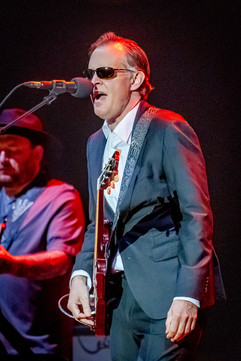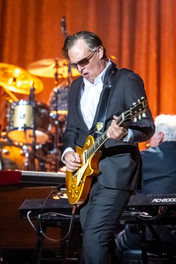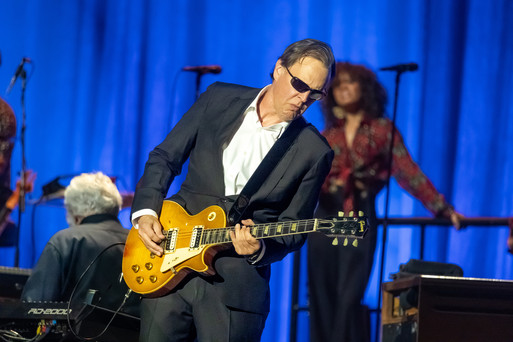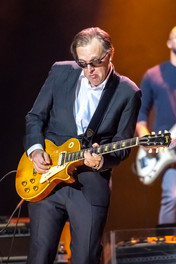Joe Bonamassa Brighton Centre
- Chris Griffiths
- May 5, 2025
- 4 min read

It’s barely been a year since Joe Bonamassa graced UK soil — including after his triumphant two nights at the Royal Albert Hall — yet already last night marked the final date of his UK arena tour, closing out a run that’s been remarkably popular with the British blues fans. The atmosphere in the Brighton Centre crackled with anticipation well before the first note was struck, and Bonamassa, ever the showman, delivered a set steeped in emotion, precision, and reverence for the blues greats that shaped him.
He kicked things off with “Hope You Realize It (Goodbye Again)”, a newer cut that immediately established the tone — thoughtful, melodic, and marked by that unmistakable Bonamassa guitar tone. The song’s bittersweet edge was enhanced by Joe’s soaring bends and subtle vibrato, a sign of maturity in a guitarist who’s long since mastered all techniques and now speaks in pure feeling.
What followed was a masterclass in blues history and curation. His take on Bobby “Blue” Bland’s “Twenty-Four Hour Blues” was delivered with grit and swagger, and Guitar Slim’s “Well, I Done Got Over It” snapped with vintage fire. Then came “Self-Inflicted Wounds”, a brooding standout from his Redemption album, and a reminder of how deeply personal his songwriting can be — tortured, honest, yet controlled.
“I Want to Shout About It”, originally by Ronnie Earl and the Broadcasters, injected a joyful swing back into the set. Here, Joe leaned into the groove, stepping back slightly to let the band breathe — a tasteful move that spoke volumes of his respect for the collective sound. He then brought the tempo down for “The Last Matador of Bayonne”, a cinematic instrumental that built slowly into a wall of sound, evoking a kind of Western-blues grandeur few can pull off.
Mid-set came Freddie King’s “Pack It Up”, delivered with playful bounce, and then “The Heart That Never Waits”, one of the evening’s emotional high points, where Joe’s phrasing felt particularly vocal and vulnerable. “Is It Safe to Go Home” and Bobby Parker’s “It’s Hard But It’s Fair” followed — both impeccably timed, the former drenched in melancholy and the latter a foot-stomping reminder that the blues can still hit like a freight train.
What remains perhaps most striking is the unwavering devotion of Bonamassa’s fans — a sea of diehards who’ve followed him from his early club days to sold-out theatres and world tours. It’s no accident. Joe has long positioned himself not just as a performer but as a custodian of the blues, pouring energy into side projects like the Keeping the Blues Alive Foundation, producing albums for emerging artists, and frequently sharing rare vinyl finds or forgotten guitar heroes on his popular social channels. That tireless commitment hasn’t gone unnoticed, and in return, his audience repays him with loyalty bordering on reverence — showing up, tuning in, and helping ensure the blues doesn’t just survive, but thrives.
The pre-encore finale — a jaw-dropping rendition of Led Zeppelin’s “How Many More Times” — was a bold, psychedelic detour that gave Bonamassa room to flex, not just on guitar, but as a bandleader weaving through time signatures and tempo shifts with the assurance of a conductor. When he returned for the encore, it was with “Sloe Gin” — the emotional closer he’s made his own — and it landed with cathartic precision, leaving the crowd standing, stunned into reverent silence before the roar returned.
Bonamassa’s choice of guitars was, as always, part of the show. A rotating stable of vintage Gibsons, most notably a 1963 SG and his well-loved Les Paul, made appearances, each suited perfectly to its song’s tone. As collectors know, Bonamassa’s guitar vault is the stuff of legend, rumoured to hold over 400 pieces, and it’s a thrill to see some of the rarest specimens in action rather than behind glass.
Supporting him was a band of seasoned pros: Reese Wynans (formerly of Stevie Ray Vaughan’s Double Trouble) on keys brought thick Hammond textures and honky-tonk colour, while drummer Lemar Carter was tight and tasteful, keeping things grounded but always grooving. Bassist Calvin Turner provided both bottom-end depth and vocal harmonies, and Josh Smith capably stands side by side with Joe accompanying on six-string — elevating the arrangements with punch and polish.
As the house lights rose, there was a sense of something significant having ended. This wasn’t just another show — it was a statement: the blues is alive, evolving, and still very much in demand. Joe Bonamassa, as ever, is both its torchbearer and its moderniser. On this final night of his UK run, he reminded us not just why we love the genre, but why it still has the power to surprise, soothe, and stir the soul.
Setlist:
Hope You Realize It (Goodbye Again)
Twenty‐Four Hour Blues (Bobby “Blue” Bland cover)
Well, I Done Got Over It (Guitar Slim cover)
Self-Inflicted Wounds
I Want to Shout About It (Ronnie Earl and the Broadcasters cover)
The Last Matador of Bayonne
Pack It Up (Freddie King cover)
The Heart That Never Waits
Is It Safe to Go Home
It's Hard But It's Fair (Bobby Parker cover)
How Many More Times (Led Zeppelin cover)
Encore:
Sloe Gin








































































Comments